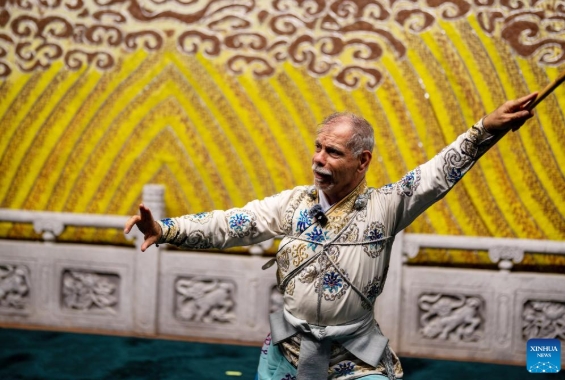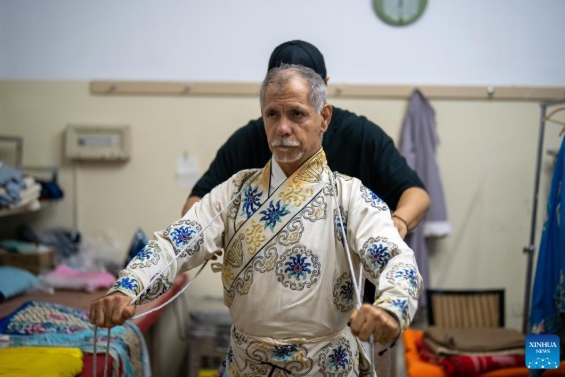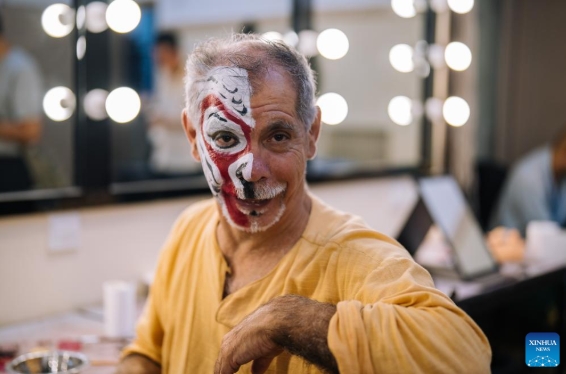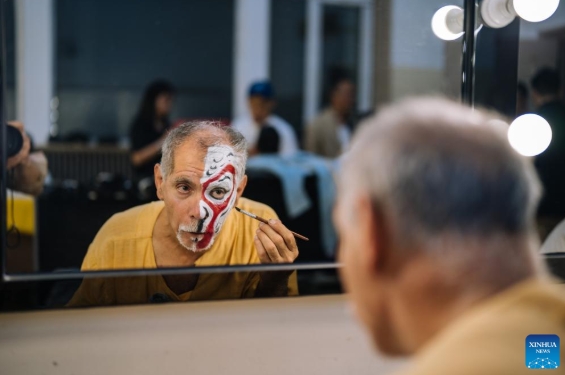"Western Monkey King" takes Peking Opera to the world

Ghaffar Pourazar performs Peking Opera in Beijing, capital of China, Sept. 30, 2024. (Xinhua/Ren Ke)
Editor's note: The hope for the China-U.S. relationship lies in the people, with grassroots connections as its foundation. While the two countries have experienced ups and downs in their bilateral ties, it is the enduring friendship between their peoples that has consistently infused warmth and momentum into this relationship. As Jan. 1 marks the 46th anniversary of the establishment of China-U.S. diplomatic relations, Xinhua is releasing a series of stories highlighting Americans who deeply appreciate Chinese culture and work actively to bridge the differences between the two nations.
The global success of China's acclaimed game "Black Myth: Wukong" has introduced the enchanting tale of Sun Wukong, or the Monkey King, to audiences worldwide. But for Ghaffar Pourazar, a British-American dual citizen living in California, this legendary figure has been a part of his identity for decades.
Seated before the backstage mirror at Beijing's Liyuan Theater, an old Peking Opera venue especially popular among foreign travelers, Pourazar deftly applies white, red and black paint to his face, transforming it into the vibrant likeness of the mischievous Monkey King.
"How time flies! Look at you, an old monkey now!" remarks an elderly from the opera troupe. "Indeed, I am now a white-haired Monkey King," Pourazar, 63, replies in Mandarin, his distinctive Beijing accent evident.
Pourazar has spent the past three decades mastering Peking Opera, establishing himself as a rare foreign performer excelling in this traditional Chinese art, and earning the nickname "Western Monkey King" for his exceptional portrayal of the Chinese superhero from the classic novel "Journey to the West."
Currently, he travels between China and the United States, serving as a cultural ambassador, introducing the art of Peking Opera to Western audiences, and offering a unique perspective of the art to Chinese audiences. "I want to be a bridge between cultures," he said, reflecting on his multicultural background.
LOVE AT FIRST SIGHT
Pourazar's lifelong passion for Peking Opera began by chance. In 1993, 32-year-old Pourazar, then a computer animator, attended a performance at London's Queen Elizabeth Hall and was instantly captivated.
"I was crying," he recalled. "I previously had a passion for various art forms, including acting, dancing, mime, and movement. But at that moment, everything else faded away. I saw the convergence of all these arts in Peking Opera."
He went to the backstage right after the show and made friends with the Chinese performers. "We didn't speak each other's language, but they could see my passion," Pourazar said.
With the help of the head of the Chinese troupe, Pourazar was enrolled at an opera school in Beijing. Just three months after his first exposure to Peking Opera, he left his life in Britain behind and moved to Beijing to train in the martial roles of the art.
Starting as an adult was not easy, as Peking Opera is a complex blend of vocal performance, mime, martial arts, dance and acrobatics. "My classmates were all children," he said. "As an adult without any basic skills, it is very hard for you to practice the movements."
In addition to the physical demands, mastering the Chinese language posed another hurdle. "I was constantly reciting the subtitles and songs, whether I was eating, bathing, walking, or even dreaming," Pourazar added.
"Though there were some extremely painful days, I enjoyed every moment," he said.
Initially, he focused on portraying ancient soldiers and generals like Wu Song and Lin Chong, before eventually transitioning to the iconic role of the Monkey King.
LIFELONG COMMITMENT
Pourazar believes that great art transcends languages. Over the years, he has devoted himself to introducing Peking Opera and Sun Wukong to international audiences, taking Chinese performers to perform in countries such as the United States, Britain and Malaysia.
He has also been teaching courses and organizing workshops in the United States, bringing Peking Opera to curious Western learners.
To better connect with Western audiences and learners, he adapted some classic plays such as "The Monkey King: Uproar in Heaven" into English versions. "I changed the spoken parts into English and kept the original songs, and it became a success on the international stage," he said.
"I am the most powerful spirit in heaven and earth," Pourazar exclaims, dressed in a signature yellow costume reminiscent of the Monkey King. As he recites the dialogues in English with the distinctive intonation of Peking Opera, he leaps, flips and executes movements that capture the playful nature of the mischievous monkey. Despite not being Chinese, his efforts bring the essence of the Monkey King to life.
Over the past two decades, his captivating performances have introduced the enchanting character to numerous international audiences. "My young nephew, who lives in Turkey, has become so enamored with the Monkey King that he taught himself to perform this character," Pourazar said.
"I love the Monkey King for his simplicity and the inner child that defines his character. His love for freedom and quest for longevity are also qualities that I respect," he said. "I believe this character resonates with people of different cultures."
With an aim to enhance communication with Western audiences, he also adapted Shakespeare's "A Midsummer Night's Dream" into Peking Opera. "By presenting a story that the Western audiences are already familiar with, I hope to more effectively introduce them to the charm of Peking Opera," he said.
In recognition of his contributions, Pourazar received the Great Wall Friendship Award from the Beijing government in 2014.
Over the years, Pourazar has accumulated numerous injuries and health issues. His right knee now suffers from arthritis and edema due to excessive exertion during a recent Peking Opera workshop in California, yet he continues his efforts undeterred.
"I rely on traditional Chinese medicine when I am unwell or injured," he said while sipping Chinese green tea from an insulated bottle. He said his love for Chinese culture extends well beyond the Peking Opera, encompassing Chinese calligraphy, painting, cuisine and Kung Fu.
Despite his health challenges and advancing age, Pourazar remains committed to his artistic pursuits.
He is currently working on two Broadway-style musical projects, both influenced by the performance traditions of Peking Opera. The first, Dream of Wukong, explores his personal journey of mastering Peking Opera, while the second, Dr. Jane Goodall, tells the story of the renowned ecologist and her extensive work with chimpanzees.
"Cultural exchange should be reciprocal. I aim to blend my expertise in opera with my multicultural background to create enriching artistic experiences for the audiences," Pourazar said.

Ghaffar Pourazar puts on Peking Opera costumes in Beijing, capital of China, Sept. 30, 2024. (Xinhua/Ren Ke)

Ghaffar Pourazar poses for a photo before a Peking Opera performance in Beijing, capital of China, Sept. 30, 2024. (Xinhua/Ren Ke)

Ghaffar Pourazar makes up before a Peking Opera performance in Beijing, capital of China, Sept. 30, 2024. (Xinhua/Ren Ke)
Editor:伏娅敏
